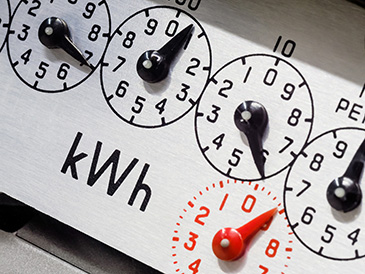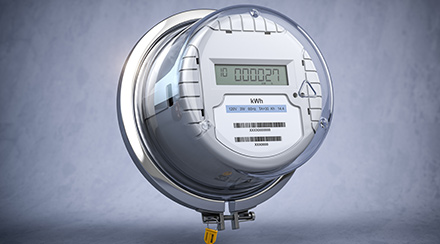What’s the Difference Between Utilities and Suppliers?

For many years, electricity and natural gas were sold the same way throughout the United States. A utility would deliver energy to nearby customers through the electrical grid and gas lines, and collect payments. And in many places, it still works that way. But due to a change called energy deregulation, customers in some states can buy their electricity or gas from a different type of company called a supplier.
What is Energy Deregulation?
"Energy deregulation" means the local energy market allows suppliers to compete for customers' business. Electric and gas utilities have historically operated as monopolies, controlling every aspect of the generation and delivery of electricity. But that began to change with the passage of the Energy Policy Act of 1992, which made it possible for private companies to compete within the energy market. A few years later, in 1996, California became the first state to deregulate its electricity market, allowing Californians to choose their own electric suppliers.
Several states have deregulated their electricity and/or natural gas markets in the years since, creating a patchwork of different energy market guidelines and allowing customers to choose where they buy their energy. With ongoing debate about the benefits of energy competition, it’s possible that more of these single-choice markets, or regulated markets, could become deregulated in the years to come. This map reflects the latest laws governing the regulation and deregulation of energy markets in the U.S.
What Is a Utility, and How Is it Different from a Supplier?
In a competitive, or deregulated, energy market, utilities and suppliers are responsible for different parts of serving energy to customers.
Utility companies deliver electricity and gas to homes and businesses through their network of transmission lines, transformers, substations, utility poles and/or pipelines. The utility is responsible for maintaining that infrastructure and restoring power when power lines go down or other transmission equipment is damaged. Utilities also track the electricity and gas consumption of their customers, either through smart meters or traditional meter reading. Customers typically do not choose their utility; this is determined by their address.
In some markets, utility companies may also compete in the consumer market and provide plans and pricing directly to customers. Utilities also often bill customers directly regardless of whether the customer has chosen a supplier. If the customer has selected a supplier, the energy supply charges will come from the supplier and appear as a line item on the utility bill. If the customer doesn’t choose a supplier, those charges come directly from the utility.
Suppliers buy electricity and/or gas from the utilities and resell it to customers. Suppliers are responsible for building pricing plans, marketing their services, billing customers and providing customer service. In competitive energy markets, customers can choose their own electric or gas suppliers and can switch suppliers for any reason. Suppliers may also be referred to as electric or gas providers, alternative suppliers or third-party suppliers.
In a regulated energy market, there are no “electric suppliers” or “natural gas suppliers” – all of these responsibilities fall to the utility. Customers do not choose their energy supplier or shop around for prices and plans. In competitive markets, customers can choose who supplies their electricity and/or natural gas. Suppliers like NRG work together with the local utility to ensure that switching is seamless.
How Are Suppliers Different?

Because suppliers are always competing for customers in a competitive energy market, each one tends to be a little different from the others. Customers can then shop, compare and make a final decision based on what matters to them.
Suppliers compete by providing a variety of plan structures, including fixed-rate plans and variable-rate plans, and offering additional benefits. Some suppliers pride themselves on excellent customer service, counting on their reputation to help them win new customers. Others may appeal to customers who care deeply about the environment or their local communities by offering renewable energy credits or making donations to area civic groups. Suppliers can even offer sign-up bonuses like gift cards, event tickets or consumer products to customers who commit to a contract period.
Who Do You Call for Assistance?
Because utilities and suppliers have different responsibilities, customers will need to contact one or the other based on their specific need.
When customers experience a power outage, see downed power lines or have a problem with their electric meter, they should call the electric utility. If customers experience gas-related issues like a leak or problem with their gas meter, they should call the gas utility.
For questions about plans or pricing, customers will contact their supplier if they have chosen one. If not, they’ll contact their utility.
For transfer service to a new address, the customer's service area will determine who takes care of the transfer. If the customer has chosen a supplier, the supplier can guide them on the process in their area. Otherwise, the customer would call their utility.
When switching suppliers, the new supplier will often notify the former supplier and the local utility of the switch.
For billing inquiries or payments, who to call depends on the service area. In many states, the utility bills customers whether or not the customer has a supplier. In these cases, customers would call the utility to pay their bill and handle inquiries.
Customers who move from a single-choice energy state to a competitive energy state may initially find it unusual to comparison-shop for electricity or gas. But by having a choice, they have a chance to find a supplier that is a perfect fit.
Looking for Something Specific?
Select a category to find resources for topics that interest you.
Select Category

Related Articles:

How to Read Your Energy Bill
When’s the last time you really looked at your energy bill? If you ever want to know exactly where your money is going – or if you might be able to save on energy costs – you should spend a few minutes taking a deep dive into your latest energy bills.
Read Article
What Are the Benefits of a Retail Energy Supplier?
If you live in a state with a competitive energy market, you probably have your choice of several suppliers that are competing to win your business. Learn why signing up with one of these suppliers could benefit you.
Read Article
What Is a Smart Meter?
Did you know energy utilities have been installing “smart meters” on homes for years, replacing old-fashioned electricity meters with the latest technology? Learn all about smart meters, its benefits, and how they can make a difference for you.
Read ArticleMost Popular Articles

Energy Plans to Fit Your Lifestyle
NRG offers electricity and natural gas plans with perks like cash back, travel rewards and more, so you can find a plan that fits your home and family.
What’s the Difference Between Utilities and Suppliers?
For many years, electricity and natural gas were sold the same way throughout the United States. A utility would deliver energy to nearby customers through the electrical grid and gas lines, and collect payments. And in many places, it still works that way. But due to a change called energy deregulation, customers in some states can buy their electricity or gas from a different type of company called a supplier.
What is Energy Deregulation?
"Energy deregulation" means the local energy market allows suppliers to compete for customers' business. Electric and gas utilities have historically operated as monopolies, controlling every aspect of the generation and delivery of electricity. But that began to change with the passage of the Energy Policy Act of 1992, which made it possible for private companies to compete within the energy market. A few years later, in 1996, California became the first state to deregulate its electricity market, allowing Californians to choose their own electric suppliers.
Several states have deregulated their electricity and/or natural gas markets in the years since, creating a patchwork of different energy market guidelines and allowing customers to choose where they buy their energy. With ongoing debate about the benefits of energy competition, it’s possible that more of these single-choice markets, or regulated markets, could become deregulated in the years to come. This map reflects the latest laws governing the regulation and deregulation of energy markets in the U.S.
What Is a Utility, and How Is it Different from a Supplier?
In a competitive, or deregulated, energy market, utilities and suppliers are responsible for different parts of serving energy to customers.
Utility companies deliver electricity and gas to homes and businesses through their network of transmission lines, transformers, substations, utility poles and/or pipelines. The utility is responsible for maintaining that infrastructure and restoring power when power lines go down or other transmission equipment is damaged. Utilities also track the electricity and gas consumption of their customers, either through smart meters or traditional meter reading. Customers typically do not choose their utility; this is determined by their address.
In some markets, utility companies may also compete in the consumer market and provide plans and pricing directly to customers. Utilities also often bill customers directly regardless of whether the customer has chosen a supplier. If the customer has selected a supplier, the energy supply charges will come from the supplier and appear as a line item on the utility bill. If the customer doesn’t choose a supplier, those charges come directly from the utility.
Suppliers buy electricity and/or gas from the utilities and resell it to customers. Suppliers are responsible for building pricing plans, marketing their services, billing customers and providing customer service. In competitive energy markets, customers can choose their own electric or gas suppliers and can switch suppliers for any reason. Suppliers may also be referred to as electric or gas providers, alternative suppliers or third-party suppliers.
In a regulated energy market, there are no “electric suppliers” or “natural gas suppliers” – all of these responsibilities fall to the utility. Customers do not choose their energy supplier or shop around for prices and plans. In competitive markets, customers can choose who supplies their electricity and/or natural gas. Suppliers like NRG work together with the local utility to ensure that switching is seamless.
How Are Suppliers Different?
Because suppliers are always competing for customers in a competitive energy market, each one tends to be a little different from the others. Customers can then shop, compare and make a final decision based on what matters to them.
Suppliers compete by providing a variety of plan structures, including fixed-rate plans and variable-rate plans, and offering additional benefits. Some suppliers pride themselves on excellent customer service, counting on their reputation to help them win new customers. Others may appeal to customers who care deeply about the environment or their local communities by offering renewable energy credits or making donations to area civic groups. Suppliers can even offer sign-up bonuses like gift cards, event tickets or consumer products to customers who commit to a contract period.
Who Do You Call for Assistance?
Because utilities and suppliers have different responsibilities, customers will need to contact one or the other based on their specific need.
When customers experience a power outage, see downed power lines or have a problem with their electric meter, they should call the electric utility. If customers experience gas-related issues like a leak or problem with their gas meter, they should call the gas utility.
For questions about plans or pricing, customers will contact their supplier if they have chosen one. If not, they’ll contact their utility.
For transfer service to a new address, the customer's service area will determine who takes care of the transfer. If the customer has chosen a supplier, the supplier can guide them on the process in their area. Otherwise, the customer would call their utility.
When switching suppliers, the new supplier will often notify the former supplier and the local utility of the switch.
For billing inquiries or payments, who to call depends on the service area. In many states, the utility bills customers whether or not the customer has a supplier. In these cases, customers would call the utility to pay their bill and handle inquiries.
Customers who move from a single-choice energy state to a competitive energy state may initially find it unusual to comparison-shop for electricity or gas. But by having a choice, they have a chance to find a supplier that is a perfect fit.
Looking for Something Specific?
Select a category to find resources for topics that interest you.
Select Category

Related Articles:

How to Read Your Energy Bill
When’s the last time you really looked at your energy bill? If you ever want to know exactly where your money is going – or if you might be able to save on energy costs – you should spend a few minutes taking a deep dive into your latest energy bills.
Read Article
What Are the Benefits of a Retail Energy Supplier?
If you live in a state with a competitive energy market, you probably have your choice of several suppliers that are competing to win your business. Learn why signing up with one of these suppliers could benefit you.
Read Article
What Is a Smart Meter?
Did you know energy utilities have been installing “smart meters” on homes for years, replacing old-fashioned electricity meters with the latest technology? Learn all about smart meters, its benefits, and how they can make a difference for you.
Read ArticleMost Popular Articles

Energy Plans to Fit Your Lifestyle
NRG offers electricity and natural gas plans with perks like cash back, travel rewards and more, so you can find a plan that fits your home and family.







